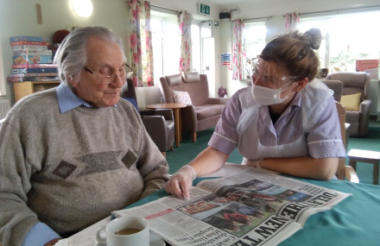A row affecting care charities working with coronavirus patients has been temporarily resolved, after the government stepped in to underwrite insurance cover.
The charity Revitalise warned earlier this week that it would soon have no choice but to return coronavirus patients from its care homes back into hospital, after insurance companies refused to provide indemnity cover for its work.
However, the government has now pledged to “introduce a targeted and time-limited indemnity offer to fill gaps in commercial cover”, lasting until the end of March.
Jan Tregelles, the chief executive of Revitalise, who has led campaigning for government intervention, said the charity was "so pleased" a solution had been found.
Care at risk
The charity was one of 130 care bodies which had agreed to act as “designated settings” and take in non-acute coronavirus patients from hospital, in a government scheme designed to free up NHS beds.
Earlier this week Revitalise told Civil Society News that it would have no choice but to return patients to hospitals at the end of this month, after every insurer in the country refused to provide adequate insurance cover for the scheme.
Some private care providers said they would be able to manage the risks of working without the insurance, but the charity said this wasn't an option for their trustee board.
Government promises care home cover for the next two months
In a statement to parliament after media coverage of the insurance issues, Nadim Zahawi, the government minister overseeing the roll-out of the coronavirus vaccine, said: “Given the severity and immediacy of the pressures facing the NHS, we want to take all possible steps to remove obstacles to sufficient local designated settings provision.
“This includes ensuring that where the creation of designated settings has created barriers to insurance, the government will introduce a targeted and time-limited indemnity offer to fill gaps in commercial cover.
“The indemnity will cover clinical negligence, employer’s and public liability where a care provider seeking to become a designated setting is unable to secure sufficient commercial insurance, or where an existing provider has been operating without sufficient cover.
“Employers and public liability will be covered by a new indemnity scheme; clinical negligence will be covered by the Clinical Negligence Scheme for Trusts, an existing state scheme. The indemnity arrangements will be supervised by the Department for Health and Social Care and administered by NHS Resolution.
“The indemnity will cover designated settings until the end of March 2021, with a review point in mid-February.”
The existing negligence insurance scheme is funded through contributions from NHS trusts. It is not yet clear what funding mechanism will be used under the new scheme.
'Delighted'
Tregelles said: "We are delighted that our message has been heard loud and clear, and would like to thank the government for their quick intervention and for finding a solution, allowing us to continue providing beds to patients who have tested positive for Covid-19, freeing up hospital beds for those with more serious symptoms.
"In this hour of need for the NHS it is crucial that care providers like Revitalise are able to step up and ease the strain of packed hospitals, and we are so pleased that the government has recognised that importance.
"We are very proud of our frontline workers.”
Insurance body: We will continue to work with government
Huw Evans, director general at the Association of British Insurers, said: “We recognise the huge pressures the NHS currently faces and welcome the opportunity to work with government on a time-limited government indemnity scheme.
“We support the scheme’s aims that where care homes operating designated settings cannot access insurance, there is an option of the government’s indemnity scheme.
“The insurance Industry remains supportive of the care home sector and will continue to work with the government on the detail of this scheme and to assist with ongoing insurance provision wherever possible in these most challenging circumstances.”
Related articles











